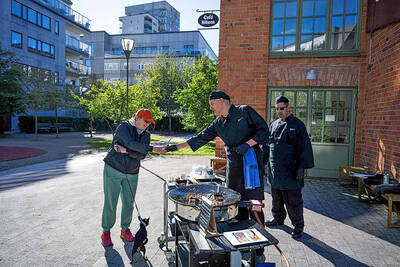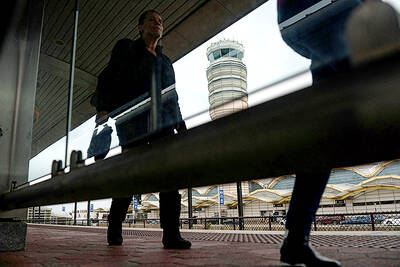Sunni tribal leaders who have vowed to drive al-Qaeda out of Iraq's most restive province met the Shiite prime minister on Wednesday, marking what Washington hopes will be a breakthrough alliance against Islamist militants.
Iraqi Prime Minister Nuri al-Maliki's meeting with sheikhs from Anbar Province -- heartland of the Sunni Arab insurgency and the deadliest part of Iraq for US forces -- was one bit of reassuring news for the US and the Iraqi government.
Al-Qaeda followers have seized control of towns and villages along the length of the Euphrates valley from Falluja near Baghdad to the Syrian border, and Washington says its 30,000 troops in the province cannot beat them on their own.
But al-Qaeda's violent ways and severe interpretation of Sunni Islam have alienated traditional-minded Sunnis.
Sattar al-Buzayi, a Sunni sheikh from Anbar Province who has emerged in recent weeks as a leader of a tribal alliance against al-Qaeda, said he and about 15 other sheikhs had offered their cooperation to the Shiite prime minister.
Fellow tribal sheikh, Hameed Farhan, said most tribes supported the agreement. He called for tribesmen to join the army and police and said Maliki promised Iraqi troops for Anbar.
Maliki's office issued a statement praising the chiefs for their commitment to fighting the militants. It was the first time he had met them since they pledged to fight al-Qaeda in a gathering at Buzayi's Ramadi home two weeks ago.
However, in a sharply worded response to recent comments by the oil minister in Baghdad, the prime minister of the Kurdish autonomous region, Nechirvan Barzani, threatened to secede if Baghdad claimed authority over his region's oil.
"The people of Kurdistan chose to be in a voluntary union with Iraq on the basis of the constitution," he said. "If Baghdad ministers refuse to abide by that constitution, the people of Kurdistan reserve the right to reconsider our choice."
The second ranking US commander in Iraq, Lieutenant General Peter Chiarelli, stressed that Washington was looking to Maliki, five months into the job, to give a lead on tackling militias, some of them loyal to his Shiite allies in government:
"We have to fix this militia issue," he said. "But I have to trust the prime minister to decide when it is that we do that."
Meanwhile, two Iraqi soldiers were killed and 10 more injured early yesterday when a suicide car bomb slammed into a checkpoint in northeast Baghdad, police said.
The attack came in a neighborhood, that has just been cleared by US and Iraqi troops as part of the Operation Together Forward security drive in the capital.
The top US military spokesman in Iraq, Major General William Caldwell, told reporters on Wednesday there had been a spike in violence in Baghdad with the onset of the Muslim holy month of Ramadan and that suicide attacks were at their highest level ever.
``This has been a tough week,'' he said.

READINESS: According to a survey of 2,000 people, 86 percent of Swedes believe the country is worth defending in the event of a military attack Swedes are stocking up on food items in case of war, as more conflict in Europe no longer feels like a distant possibility, and authorities encourage measures to boost readiness. At a civil preparedness fair in southwest Stockholm, 71-year-old Sirkka Petrykowska said that she is taking the prospect of hostilities seriously and preparing as much as she can. “I have bought a camping stove. I have taken a course on preservation in an old-fashioned way, where you can preserve vegetables, meat and fruit that lasts for 30 years without a refrigerator,” Petrykowska said. “I’ve set aside blankets for warmth, I

FRUSTRATIONS: One in seven youths in China and Indonesia are unemployed, and many in the region are stuck in low-productivity jobs, the World Bank said Young people across Asia are struggling to find good jobs, with many stuck in low-productivity work that the World Bank said could strain social stability as frustrations fuel a global wave of youth-led protests. The bank highlighted a persistent gap between younger and more experienced workers across several Asian economies in a regional economic update released yesterday, noting that one in seven young people in China and Indonesia are unemployed. The share of people now vulnerable to falling into poverty is now larger than the middle class in most countries, it said. “The employment rate is generally high, but the young struggle to

ENERGY SHIFT: A report by Ember suggests it is possible for the world to wean off polluting sources of power, such as coal and gas, even as demand for electricity surges Worldwide solar and wind power generation has outpaced electricity demand this year, and for the first time on record, renewable energies combined generated more power than coal, a new analysis said. Global solar generation grew by a record 31 percent in the first half of the year, while wind generation grew 7.7 percent, according to the report by the energy think tank Ember, which was released after midnight yesterday. Solar and wind generation combined grew by more than 400 terawatt hours, which was more than the increase in overall global demand during the same period, it said. The findings suggest it is

IN THE AIR: With no compromise on the budget in sight, more air traffic controllers are calling in sick, which has led to an estimated 13,000 flight delays, the FAA said Concerns over flight delays and missed paychecks due to the US government shutdown escalated on Wednesday, as senators rejected yet another bid to end the standoff. Democrats voted for a sixth time to block a Republican stopgap funding measure to reopen government departments, keeping much of the federal workforce home or working without pay. With the shutdown in its eighth day, lines at airports were expected to grow amid increased absenteeism among security and safety staff at some of the country’s busiest hubs. Air traffic controllers — seen as “essential” public servants — are kept at work during government shutdowns, but higher numbers